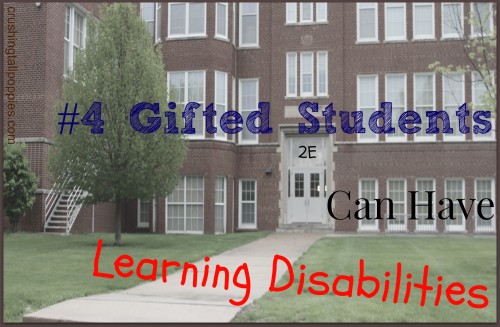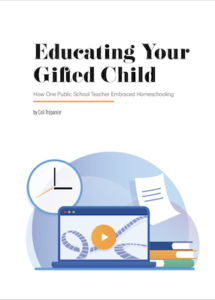#4 Gifted Students Can Have Learning Disabilities

Twice-exceptional – gifted with one or more learning disabilities or learning differences.
Twice-exceptional (or 2E) children can have extra burdens on them, more so than other gifted children, for several reasons which are related to the simple fact that children’s giftedness or higher-than-average intelligence is often masked, offset or overshadowed by their learning differences or disabilities in school. Given the well-known fact that too many educational professionals in our school systems today seem to only recognize gifted children as those who are very intelligent and excel in the classroom, we then fail to identify many gifted children who may not fit this stereotype, and fitting this stereotype can be especially difficult if the specific educational needs of the gifted child are not being met. Underachievement, boredom and frustration can set in when gifted children are not provided an appropriate education at school, and then their grades and scores suffer. Subsequently, these unidentified gifted children will then likely fall through the cracks of our educational system. If a gifted child’s intelligence (giftedness) is coupled with a learning disability or a learning difference, this makes gifted identification or educationally addressing a child’s giftedness an even more remote possibility!
Learning disabilities and learning differences such as ADD/ADHD, dyslexia, dysgraphia, visual-spatial strengths, autism spectrum disorder, and sensory issues can all be present in a gifted student. And these learning differences and disabilities can mask or overshadow the gifted child’s intelligence. When a child with dyslexia struggles to read, it seems easy to understand how a teacher who is not familiar with giftedness would never consider recommending this student for gifted identification testing. What a tragic loss!
For me that “2” in 2E stands for twice-neglected by our schools, twice the issues for parents and twice the confusion for gifted identification. And twice the likelihood that an appropriate education will NOT be provided to a 2E child. Raising and advocating for a gifted child is difficult; raising and advocating for a 2E child is often times twice as difficult.
According to Areva D. Martin, Esq. in the article, “The 2e Dilemma: Understanding and Educating the Twice-Exceptional Child”, she states that, “Over the last decade, the question of how to address the educational needs of twice-exceptional students has perplexed educators, many of whom balk at introducing special education modifications and related services into their gifted and honors programs. This short-sightedness is a blow to the twice-exceptional student who cannot access the advanced programs and experiences frustration, low self-esteem and academic failure.”
Misdiagnosis of learning disabilities is another issue to plaque gifted 2E children and their parents. The cases of ADD/ADHD have risen sharply in recent decades. Is it because it has become an easy, catch-all for struggles in the classroom? Boredom and “zoning out” in the classroom where the gifted child is unchallenged and forced to learn in ways that do not meet his needs is often seen as a classic case of ADD/ADHD. My youngest gifted son was recommended by his teachers and schools to be evaluated for ADD on three separate occasions, and each time, nothing was found to warrant an ADD diagnosis – he was simply a visual-spatial learner who was unchallenged and trying to learn in an auditory-sequential classroom. Additionally, some typical characteristics and traits of gifted children are often misdiagnosed as a learning disability, but are not. Now, the waters are further muddied when a learning difference or disability is misdiagnosed and giftedness is not even a consideration to pursue. Misdiagnoses and missed-diagnoses … the complexities are frustrating for 2E gifted children and their parents!
My own personal 2E frustrations lie with visual-spatial thinking. Strong visual-spatial abilities, although considered an asset, a talent now deemed necessary to fulfill the rising demand for creative jobs in technology, science and design, is also considered a learning difference within our school systems. A gifted child with strong visual-spatial thinking and strengths (or weakness if in a classroom) designates a gifted child as being twice-exceptional. (Read more about visual-spatial learners here) I have two gifted sons with strong visual-spatial abilities and their VSL traits made learning a struggle for them in our auditory-sequential school system. When their performance in school was not as expected, teachers suspected the often-misused reasons – ADD/ADHD, laziness and poor work ethic – and as parents, we were asked to “fix” these problems. On more than one occasion, it was suggested that my child’s gifted designation may have been an error. The presence of a learning difference or disability in gifted children definitely confounds the correct diagnosis and also confounds the likelihood that the gifted child will receive an appropriate education.
Personally, I know little about the many twice-exceptionalities of gifted children except for my own children’s visual-spatial strengths/learning differences. What I do know is that giftedness brings so many added and difficult dimensions to raising a child; the dimensions of raising a twice-exceptional gifted child can double that difficulty with trying to find the correct diagnosis and advocating for your gifted child to receive an appropriate education. The exceptionalities present problems in school, confound educators, can be misdiagnosed and place added burdens on the gifted child. Parents should educate themselves on giftedness in children and with the exceptionalities in twice-exceptional children in order to be prepared when having to discuss these issues with doctors, therapists, psychologists and educators who may not know as much as they could about giftedness and the learning disabilities gifted children can have.
In my recent blog post A Gifted Child Checklist for Teachers , I listed ten basic characteristics and traits of gifted children. It is a list intended to easily help teachers and others by providing a brief and basic listing of gifted traits and characteristics which aren’t always so well-known, recognized or obvious. I also hoped my checklist would bust some myths and correct some incorrect information about giftedness.
WEBSITES:
GIFTED HOMESCHOOLERS FORUM – TWICE-EXCEPTIONAL/2E
HOAGIES’ GIFTED EDUCATION PAGE – TWICE-EXCEPTIONAL
2E TWICE-EXCEPTIONAL NEWSLETTER (website)
ARTICLES:
“The 2e Dilemma: Understanding and Educating the Twice-Exceptional Child” By Areva D. Martin, Esq.
“Misdiagnosis and Dual Diagnosis of Gifted Children“ by James T. Webb, Edward R. Amend, Nadia E. Webb, Jean Goerss, Paul Beljan, F. Richard Olenchak
“We Need to Value Spatial Creativity” by Jonathan Wai, Ph.D.
BOOKS:
If This is a Gift, Can I Send it Back?: Surviving in the Land of the Gifted and Twice Exceptional by Jen Merrill
Misdiagnosis and Dual Diagnoses of Gifted Children and Adults: ADHD, Bipolar, Ocd, Asperger’s, Depression, and Other Disorders by James T. Webb, Edward R. Amend, Nadia E. Webb, Jean Goerss, Paul Beljan, F. Richard Olenchak, Paul Beljan, F. Richard Olenchak
 Crushing Tall Poppies
Crushing Tall Poppies




Pingback: A Gifted Child Checklist for Teachers | Crushing Tall Poppies
Some learning disabilities are discovered at birth, while others are not diagnosed until much later. If your child is diagnosed at or around birth..their doctors probably won’t be able to tell you exactly how it will affect their development. The extent of your child’s disability will become clearer as they reach the ages when they should be talking, walking or reading.Thanks for sharing.
Thank you for adding your knowledge and expertise here!
Pingback: As President, What Will You Do for Gifted Education? | Crushing Tall Poppies
Pingback: Gifted Children Stuck in the No Passing Zone | Crushing Tall Poppies
Pingback: I Have a Gifted Kid and I Will No Longer Be Ashamed | Crushing Tall Poppies
I have a son in the 8th grade who is very gifted. He is the top tester in his school and the lowest school work doer in school. I have always given my child the access he needs to learn what ever intrests him. In his school he is very bored and is in trouble all the time. I’ve tried to explain to the falculty at the school that my son is just bored and they are not challenging him. He was reading the encyclopedia for fun after-school since he was five. He is very interested in science and history. I just can’t understand why the school won’t cooperate and find a ciriculum that is more apporopriate to his learning ability. Is there something you could suggest. I really don’t want him to feel he is not good enough in his learning proccess and just deside to stop his self learning all together. Oh and he is not very well liked by the other students or the teacher because he is kind of a know it all and will correct you. This angers the teachers and they will send him home for being rude to them. I do not find this rude I find this to be educational for them. Instead of seeing if he is right they just dipose of the problem and send him away. Thats doing a fine job to him.
Shannon, what you have described is exactly what many gifted students have experienced in traditional schools where teachers and administrators don’t seem to fully understand the unique traits and learning needs of gifted learners. There are many ways to handle your situation, but only you can decide what is best for your son. My suggestion would be to read and research as much information as you can find on sites like GIFTED HOMESCHOOLERS FORUM, HOAGIES’ GIFTED EDUCATION PAGE and SENG. Also, pose any questions you have to other parents on forums for parents of gifted children such as GIFTED HOMESCHOOLERS FORUM and DAVIDSON GIFTED ISSUES DISCUSSION FORUM. Good luck and keep in touch!
Really like your point about being “twice neglected.” That unfortunately characterizes what occurs for so many of these children.
Yes, sadly so many of these 2E children are twice-neglected, and this just shouldn’t be happening to any child. Thanks again for your welcomed comments, Gail!